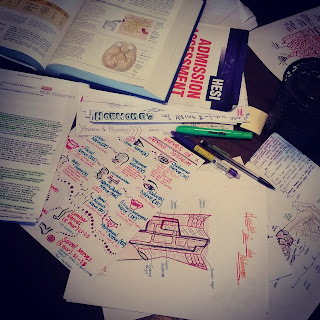*-*-*-*-*
 |
| Photo retrieved from https://www.nextavenue.org/wp-content/uploads/2016/02/6-Signs-of-Nursing-Home-Neglect-519661765.jpg |
There is definitely a culture in nursing school, especially created by professors, that if you do not like your clinical rotation then nursing may not be the right major for you. The claim is pretty convincing. Clinical is your chance to get as close as you possibly can to what you will actually be doing as a "real life" registered nurse. So if you hate it, does that not mean you will hate being a nurse?
I remember a time during Level 1 of the nursing program, when I saw a meme about it being awful to wake up for clinical. Curious, I peeked at the comments to find that practically everyone said they were always excited to go to clinical in the morning. A few people did come out and say they personally did not like their clinicals, but their comments were attacked by others saying that they "should not be a nurse" or that they "did not take full advantage".
I kind of let this, and my professors at the time, get to me when I took my first clinical. I briefly talked about my first clinical once when I first started this blog, and I really did hate it. It was only a five day, eight hour geriatric rotation, but it felt like it went on forever. I was so excited that first day, that I arrived an hour and a half early! My purple scrubs and pearly white shoes were squeaky clean, my smile was huge, and my heart was pounding in my ears.
I remember walking in to that facility my first time, the scent of feces and old laundry immediately hitting me with a reality check. Elderly were scattered in the hallway with their wheelchairs while the staff whisked around them doing everything except pay attention. Call lights lit up the hall like Christmas while one nursing assistant did them all by herself. I thought to myself, "you just barely walked through the door. Don't judge it just yet."
I was assigned to an LPN for the day, who, like all of the other LPNs, was responsible for about twenty patients for her shift. She began loading up the cart, popping all of her patient's pills into cups all at once and walking her little cart to one side of the hall, working down. Medication administration was all very interesting at first. Except that, once she was done with morning medications, it was time for midday medications. She popped the pills for all of her patients once again, rolled her cart back down to one side of the hall and began working her way down the hall again. As soon as she was done with that, this repeated again for the afternoon medications. Not once did she do anything except chart and pass meds. She was too busy to give time to any of her patients.
The patients all seemed very depressed. Many had gaping pressure ulcers associated with their stay at the facility, likely because they were bed-bound and never turned on schedule. One wheelchair-bound woman in the hallway kept reaching out to me, moaning something I could not understand. I tried to figure out what she needed, but I still could not understand after she repeated it multiple times. My nurse groaned, "don't pay any attention to her. She always does that." Hesitant, I stepped away and went back over to where my nurse was passing out medications. I wanted to do more, but it was my first day, and I had no idea what I was allowed to do in that situation. The woman still watched me, with a look I could only describe as frustration that she could not communicate what she wanted. The woman sat in that wheelchair in front of the nurses station the entire time that I was there. I eventually told one of the other staff at the nurses station that she needed something, and the staff member simply shrugged and went on with her work. It broke my heart.
I remember getting into my car after that long first day, calling Chayton, and breaking down as I drove home. I hated how nobody cared. I hated that the nurses only ever passed medications. I hated that it took multiple washes before the smell of that facility came out of my scrubs. My experience was awful, and since that was my only experience to go off of, I began to rethink my choice in career. When my alarm clock went off at four in the morning those next four days, I absolutely dreaded getting out of bed.
Finally, towards the end of the rotation, me and many of my fellow classmates admitted that we dreaded coming to clinical. One girl even admitted that she rethought why she even wanted to be a nurse in the first place. I felt better after this conversation, to know that I was not alone. I hope, if you are reading this and are hating one of your clinicals, that you do not feel alone either.
The next semester, I took clinicals on med-surg and psych units. Although I am not super passionate about those units, and still dreaded getting up some days, I had a much better experience. I really enjoyed what I learned during those clinicals, and regained my appreciation for nursing. The next semester, I got to do OB. I was so excited to come to clinical every single day of that rotation. The day that I got to be in the Labor & Delivery unit, I got to watch multiple births and learned a ton about fetal monitoring. To be completely honest, I had tears well up in my eyes when I witnessed my first birth (I know... kind of embarrassing). I was so passionate about what I was learning in clinical. I found exactly where I wanted to be in my career.
In high school, I loved science and english, but I absolutely hated math. Each clinical focuses on a different subject matter, so why is that any different? The answer is that it is not different at all. You do not have to love every single clinical rotation to love nursing, because you are most likely not going to work in every single unit as a nurse. Everyone is different, which is why there are so many different specialities!
Another point is that there are so many factors that could influence your experience in clinical: the facility, your preceptor, your nurses, the other staff, the patients... The list goes on. Perhaps I would actually like Geriatrics, but the facility that I went to gave it a bad rep. If you hate a clinical, wait it out and see how the next one goes. If it is just as bad, then ask yourself: what makes it bad? If you really do not like any of your clinicals, then maybe you can rethink things a bit. But if it is simply the staff or your preceptor causing a bad experience, that does not necessarily mean that nursing is going to be a bad experience for you.
I have not yet experienced "real life" nursing, so I cannot speak on that. But I can say that just because you hate a clinical, does not mean you won't find the one that you are passionate about. Nursing school is all about learning, and that includes learning about what interests you (and what doesn't)!
*-*-*-*-*
I hope that this post helps to demystify the "you must love all clinicals" culture in nursing school. I also hope that, if you are struggling to see past a clinical, that this shows you that you are not alone.
I've noticed a bit of a trend in my blog posts: that I kind of focus on the negative parts of nursing school more than the positive. I am sorry if this makes nursing seem, for lack of a better word, crappy to you. That is not my intention. The thing is, I feel there is a lot to learn from the negative experiences that I have had in school. There are tons of posts about how awesome nursing is, but you never see the ones about the struggles or the negativities.
I have grown a lot from the negative happenings from nursing school, and I want to be able to look back on this blog and remember the lessons I learned from those experiences. I do not want to be one of those peoples that forgets my bad clinical experiences, and then posts about how I "loved all of my clinicals" on a facebook meme.
Let me and the others reading this know in the comments which clinicals you hated and which ones you loved! Please hit the like button or share if you feel this post spoke to you, and subscribe if you want notifications of any of my future posts! I have lots of ideas (just not a lot of time). 😉 💜





